An issue after Arthur S. Hoffman had left, but at least some of the stories must have been selected by him earlier. Cover by Remington Schuyler with interior illustrations by Ralph Nelson.
The Gorilla of No. 4 · J. D. Newsom · ss 3.5/5
A great story from Newsom about the French Foreign Legion. It starts with the commandant of a French outpost in Southern Morocco hosting a group of visiting dignitaries after “pacifying” the region with machine guns. The commandant has just turfed out a visiting holy man, and this sparks a holy war. The captain in charge of the Foreign Legion detachment is shot and killed by the rebels in the first attack, and the captain puts an outsider in charge of the Legion. The outsider rubs the Legionnaires the wrong way and they are sent on a punishment outing to scout the rebels. The resulting fight kills many Legionnaires. Their leader goes back to the commandant with a story of how the Legionnaires almost mutinied, and they are put under arrest. They are seething under this unjust punishment when a gorilla-like officer, clearly not a gentleman, shows up and takes charge…
 |
| Adventure, January 1, 1928 – Illustration by Ralph Nelson for The Gorilla of No. 4 by J. D. Newsom |
THE MOONLIGHT gleamed on the couples dancing on the terrace of the officers’ mess at el Kelima to the slightly piercing strains of the “Valse d’Amour,” played by the band of the Moroccan Tirailleurs.
Against the balustrade leaned Colonel Jean St. Simon de Liancourt, swinging a monocle at the end of its thin black ribbon. He was a stout, small boned little man of about fifty-five, dressed in a snow white uniform trimmed with gold. Many medals glinted on his left breast. His thin, sharp featured face expressed the most complete self-satisfaction and self-confidence. He had limpid blue eyes, an aquiline nose and a small, tight lipped mouth.
“Yes,” he was saying to a slim, fair lady, “undoubtedly. This is a great moment! When I think that two years ago—two years ago tomorrow—I set eyes on el Kelima for the first time! On the very spot where we are now standing, dear lady, the blood of my brave men ran in streams!” He gave his monocle a little flip and sighed reminiscently. “The Ouled-Farik made their last stand on this hillock. We carried it at the bayonet point . . . Yes, and to think that today we inaugurated the el Kelima race track!”
“Progress!” smiled the lady, looking up at him between long black lashes. “How wonderful it is—all this! Such a beautiful place! I never dreamed there was anything like this in southern Morocco! I thought it was all desert and rebels, you know. At least that’s what everybody says at Rabat.”
“Oh, we have civilized the territory,” laughed the colonel. “Pacified it completely. There were rebels aplenty, I assure you. It took me almost twelve months to make these people understand that we were here to stay. I flatter myself they have learned their lesson. I stood no nonsense of any kind.” Here he put the monocle in his right eye and looked stern. “It pays,” he added. “No doubt about it. And then, of course, as soon as I had the tribes well in hand I went to work— rebuilding.”
“They say such nice things about you at Rabat,” cooed Mme. Perigoud.
The colonel bowed gallantly. He felt that they could never say as many nice things about him at Rabat as he really deserved, which was one of the reasons why he had taken Mme. Perigoud aside for a little tete-a-tete. Not only was she very charming, but she was also the wife of a most influential man on the political side, and the colonel felt that he was ripe for a really important post—a governorship or Something equally fulsome.
“The moonlight—” began Mme. Perigoud, stifling a small yawn.
“Oh, yes! The moonlight! The desert moonlight.” The colonel tried to register deep emotion.
“Two years ago it looked down upon a scene of barbarous savagery. Today that glistening orb sees the far flung vanguard of a great civilization going about its business in peace and safety!”
Mine. Perigoud glanced anxiously over her shoulder. The colonel was, admittedly, a great colonist, but he could also be a great bore. Like many another pretty woman, she wasn’t interested in Peace and Progress; she was interested in herself. Still, the colonel had his good points. He had brought together at el Kelima some of the most entertaining young officers. Not one of them was an outsider: most of them had money; all of them were charming. They flirted so tactfully. They were so decorative.
Hell an’ High Water · Stephen Payne · ss 2/5
A cowboy tale of no particular distinction.
 |
| Adventure, January 1, 1928 – Illustration by Ralph Nelson for Hell an’ High Water by Stephen Payne |
HELLO, Mr. Keys, come right in. Java’s boilin’ on the stove and we’ll have supper in jig time. Mighty glad to see you come prognosticatin’ out to your lonely range camp in the Ever Rollin’ Hills, where you should ought to build the Key Hole range rider somethin’ a mite better’n a dugout for a home.
How’s things? Oh, all jake, I guess. I has had company of a kind, recent and plentiful—yell, more’n plentiful—such as ’twas. Eh? You noticed the absence of one of my string of nine ponies from the pasture—the roan I called Tinhorn?
Eh? No, your eyes didn’t deceive you. He ain’t there, but I ain’t traded him off or sold him or give him away. Then where is he? Well, I couldn’t exactly say. The last I saw of that poor pony he was headed down Rawah river like he never intended to come back? and I don’t reckon he will.
Caribou Coming! · A. DeHerries Smith · ss 2/5
An unscrupulous trader schemes a way to fleece Native Americans for ammunition. A Mountie saves the day.
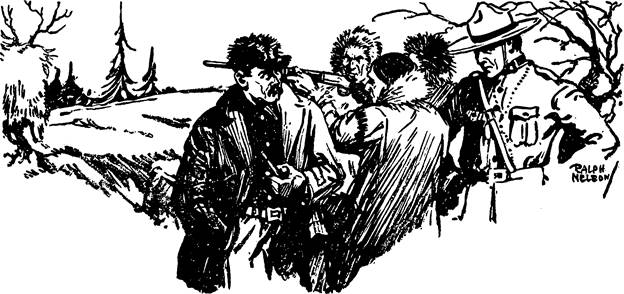 |
| Adventure, January 1, 1928 – Illustration by Ralph Nelson for Caribou Coming! by A. De Herries Smith |
“DON’T like this trip. Too darned near the freeze up to suit me,” Sergeant Blair grumbled, narrowed eyes ranging out beyond the schooner’s deck to where the Great Slave Lake’s icy waters lapped red cliffs.
“Enh-enh,” Constable Corrigan grunted in reply. “Was there any cows shassayin’ around here a guy could make his fortune with ice cream; cost nothin’ to freeze the stuff. Ho-hum! This old barge’ll never win the America’s cup. She’s a moose cat at goin’ backwards.”
The sergeant nodded in mute agreement. His gaze went aloft to the flapping canvas, then back to the desolate shore line.
“Hanged if I can figure out why there should be any trouble with the Indians at the Killing Place,” he mumbled, half to himself. “All the Yellowknives have to do is to go out and shoot the caribou until they’re sick of it. Why, with the way the deer herds pour through the pass even the old men can lay up enough meat in a few days to keep their teepees going all winter. Can’t make out what the racket is.”
“Me neither.”
The constable sighed, throwing the wheel over to catch a puff of wind that momentarily stirred the lake’s glassy surface.
“These apes here seem to think some one is tryin’ to do ’em dirt though.” Corrigan waved a contemptuous moccasin at the deerskin clad figures huddled down in the patrol boat’s cockpit.
“Well, Mike, we’ve got to look into the thing, whatever it is,” the sergeant said, decision in his low voice. “Our job is to see that the tribes are fixed up with caribou meat for the winter and we’re going to do it. Guess I’ll go below and look over the engine. If the wind drops off any more we’ll have to use the old tin can.”
The Sun Chasers [Part 4 of 5] · Hugh Pendexter · sl
No review because this is not part 1 of the serial.
 |
| Adventure, January 1, 1928 – Illustration by Ralph Nelson for The Sun Chasers by Hugh Pendexter |
EARLY in the Fifties when Nebraska was opened to homesteaders the temporary towns along the Missouri River were filled with restless pioneers who had followed the setting sun, some to press onward to the more dangerous frontiers of the gold fields and some to linger by the grassy hills and fertile bottoms they had found. Of such are empires built—those who hunger for land and gold, but are willing to suffer and work for it.
Roscoe Strong brought his son and daughter from Maine and founded a farm on a quarter section near Plattsmouth. After a hard winter and a summer in which the grasshoppers devoured their crops, the Strongs moved on to the North Fork. There many old friends who had shared the Strong larder in the first hard days looked them up. Old Bird of Freedom, a genial wildcat banknote speculator, brought his grandniece to visit Sam and Ruth Strong. Old Freedom immediately bought a herd of cattle from Strong’s neighbors in the big soddy over the hill, paying for them with worthless paper. Nancy Freedom, not knowing that the neighbors were the notorious Toms gang of outlaws, rode over to pay them honest money.
Chechako Song · Noel H. Stearn · pm
Of Gallantry · F. R. Buckley · ss 3.5/5
Luigi Caradosso, warrior for hire, tells a story of brotherly love from his past. Love and hate joined in vengeance. It’s hard to write about the story itself without revealing too much, except that I found it a great noirish tale.
 |
| Adventure, January 1, 1928 – Illustration by Ralph Nelson for Of Gallantry by F. R. Buckley |
TO THE hands of the respectable Messer Ugo Valdifiore, treasurer to my good and gracious lord, my Lord Duke of Rometia; these:
Valdifiore:
I TELL thee, it is not well to bait me now; I have four weeping wounds, and my garden hath gone to ruin while I have been away. If any more accountings are demanded of me, I will come cut thine ears off, potbelly.
The number of horses killed under me was indeed four; I am not in the habit of writing IIII to signify one. And the armorer who spent VIII hours, which meaneth eight, taking the dents out of my armor was one Jacopo, who holdeth forth on the Ravenna road, near where we stopped the pursuit. I now remember that he repaired also five links of my chain mail, which addeth to the bill XI soldi (eleven).
I look for an early payment.
—l. caradosso, Captain.
To my most illustrious and excellent lord, His Highness Grace my Lord Duke of Rometia; from L. Caradosso, a farmer, these:
My lord:
IT WAS welcome, once more to see your Grace’s hand of write upon a missive, what though the matter conveyed was severe. This is my first communication from your Highness since the letter summoning me to return to the command of the army. I am aware that your Lordship has been much occupied; I hope the gracious Lady Allegra is well, and not too much distressed by the defeat of her brother’s forces. Even the desire to avenge a sister’s seduction should not have induced him to charge me with insufficient cavalry.
Leather Cannon · J. R. Johnston · ar
Half Pint · Frank J. Schindler · ss 1.5/5
Cowboy story with a weak plot and almost no characterization.
 |
| Adventure, January 1, 1928 – Illustration by Ralph Nelson for Half Pint by Frank J. Schindler |
OLD MAN TRAVERS, owner of the Bar G ranch, read the big city papers and then passed the papers on to the waddies killing time around the bunkhouse in the evening. Whether Goodie Holmes got his crazy idea from reading the newspapers— they were full of stories about college students who were shuffling off this cock eyed world by way of the suicide route— it is hard to tell; but one night he developed a suicide complex, tried to get himself knocked off and finished up by killing six bank thieves. Moreover, the experience cured him.
I’ll tell you how it was. Goodie was a half pint cowpoke, about five feet four inches in height, although his slightly bowed legs made him look even shorter. By all the nomenclature of the range he should have been another Shorty, but his name was Goodwin and the bucka-roos dubbed him “Goodie.” In spite of his size he was a top hand with cows. One thing everybody knew; he had lots / of spunk and courage. He was afraid of no man. His motto was, “The bigger they are, the harder they fall.” He had proved that on several occasions.
Although the days were gone when a man had to carry a gun, he practised assiduously with two big frontier model Colts. In his own estimation he thought he was the greatest shot in the West. He was good, but not quite so good as he thought he was. He liked to brag about his shooting, which would bring a snort of derision from old Baldy Sours, a grizzled old cow hand who had been herding cows since Sitting Bull was laid to rest. Baldy could draw a gun fast and with a pair of six-guns make music that would put a symphony tympan drummer to shame.
Dorymates · George Allan England · ss 3.5/5
Two men in a fishing boat. One is a thrice married man. “Women’s women, have one, have all. I’m glad to be clear o’ married life, an’ every time ye wants to go on the booze, havin’ to fight with a wife about it. When a man’s hat covers all his family, ba God, he’s the best off. Take ’em quick an’ leave ’em in a hurry—that’s the best way!”
“ ’Specially havin’ young uns,” he mused. “That’s the worst of it, Peter, the young uns is. No young uns for me! Don’t ye waste no time or money gettin’ married. Have a good enjoyin’ time while ye go. ’Baccy an’ rum makes things hum, ye mind. I rather spend my money for such. What in hell’s the use bein’ poor, when ye can feel rich for a dollar’s worth o’ rum?”
The other is a man looking to get married for the first time, and saving money for that reason.
“I ain’t agreein’ with ye,” contested Peter a little grimly. “This here gal o’ mine, she’s worth givin’ up a lot for. She ain’t no jazz baby. She’s a settled down woman nigh me own age, an’ got a b’y ten year old. Her man was drowneded long ago, on the Banks. She’s had an awful hard time, workin’ on the fish flakes, takin’ in wash, an’ all, to get along an’ bring up that kid o’ hers. She knows how to take care o’ money an’ make a good home. I loves that gal, an’—”
“Huh! You, takin’ another man’s leavin’s!”
Peter shrugged his shoulders.
“I don’t see it that way, Ba’tiste. An’ he’s a fine young feller, that lad is. I’d love him like me own. A b’y to take hold an’ work with me—that’s better’n waitin’ years for one o’ me own to get half growed up! An’ the woman—”
A well-written atmospheric story of inner turmoil; the only weak element is that the plot hinges on a big coincidence.
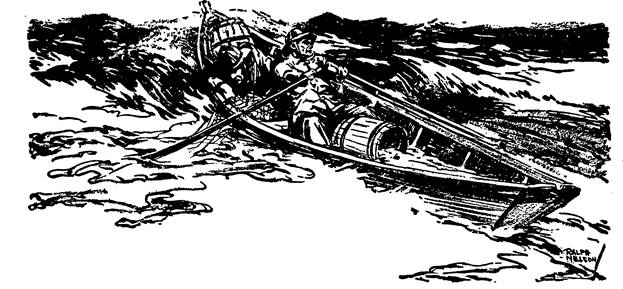 |
| Adventure, January 1, 1928 – Illustration by Ralph Nelson for Dorymates by George Allan England |
RAW YELLOW flares from greasily smoking torches in the night flung huge grotesque shadows up the foresail and along the deckhouse—redolent of cod and haddock, silver spotted with scales—as dory No. 9 made ready to be dropped. Gigantic black arms and legs moved a-loom in silhouette on taut canvas that swayed against the northern stars.
“All right!” shouted skipper Ezra Nye from the wheel.
A vague, oilskinned figure, half heard through the chut-chut-chutter of the Diesel’s exhaust, he raised his arm in a signal stiff and wooden as a marionette’s.
Two men were crouching in the dory. Two had gone out or would go in every one put down by the schooner. For old Ezra, a highline fishkiller, driver and sail dragger, had decided to “work double dory” on that early morning’s slack tide.
At the stern of dory No. 9 as she hung outboard against the battered rail, Peter Kennedy hove his keg buoy. The blackball fast to it on a slender pole plunged in tumbling, foam-spun surges. It leaped up, dipping again as the keg bobbed aft, snatched swiftly away by the rush of the heavily rolling vessel under both sail and engine power. Into the awesome majesty of star flecked night and sea faded the crude “9” daubed on the black-ball. The carefully coiled line twitched away.
The Cootie Complex · Carl Elmo Freeman · ss 1/5
Another allegedly humorous cowboy story. Not worth reading.
 |
| Adventure, January 1, 1928 – Illustration by Ralph Nelson for The Cootie Complex by Carl Elmo Freeman |
THE HATCHET wagon was camped at No. 9 windmill beside Duck Lake. As the lake now contained considerable surface water the windmill was not in operation. And Bolt Jones, the wind-miller, just back from a vacation, had seized the opportunity to install new babbitt bearings in the mill head.
The Hatchet wagon is noted for its hospitality. If you happen along about supper time, Pot Owens, the cook, will invariably insist that you hang on the feed bag. He will hand you a tin plate, a cup and the available dissecting instruments and suggest that you cleave the meat from the bone. If it is drizzling, you will be pressed to stay all night and go home in the morning when the mud has settled. And each of the crew will make you think he would consider it an honor to share his bed with you. That is, if you are white.
But there are limits to hospitality. If an Indian, out hunting some of his scrawny horses which have strayed off the reservation, happens along, things are different. Pot will feed Lo, the poor Indian, till he presents those perceptible curves characteristic of well being. And if they have just butchered a fat yearling Lo may have the intestines to take home if he wants them—thus robbing the dog of his just and rightful inheritance.
However, it can be raining pitchforks, croquet balls and wet cats, but not a waddy will consider it incumbent upon him to share his bed with his red brother.
Letting an Indian sleep in an absent waddie’s bed is a classic joke in parts of New Mexico. And like all jokes that have stood the test of time, it always gets a laugh. Everybody laughs. That is, everybody but the waddy that owns the bed.
The Army Is a Small Place · Leonard H. Nason · ar
The Carnival Kid · Edward L. McKenna · ss 3/5
A small piece of social commentary about life and choices. Good observation of characters and life at the bottom of the socio-economic ladder.
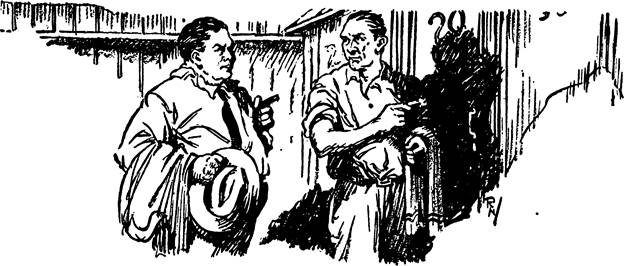 |
| Adventure, January 1, 1928 – Illustration by Ralph Nelson for The Carnival Kid by Edward L. McKenna |
NOBODY on the beach knew who he was, and he was glad no one did. There had been a little disturbance, one night in April, in the town his show was playing, and the next morning the kid wasn’t there to bally for his little game with the cute gimmick. No, indeed, he was not there—he was in Peoria, or Danville, or Cairo, or Chicago —wherever it was that the rattler had carried him. Nobody knows except the Kid.
How he got to the beach is not in the books either. It was a long hard road and it must have wound up hill, judging by the blisters on the Kid’s hands and by the condition of his clothes. Perhaps his appearance gave him more discomfort than anything else, for he was as clean as a cat naturally and he loved new clothes and bright neckties. When he came up to the Ideal Bathing Pavilion that Sunday morning he had no tie on at all, just the collar of his shirt turned in, but he had achieved a shave somewhere, and before the sun came up, he’d been in the ocean, from some deserted jetty, and with a wary eye for a prowling cop.
He asked old man Papologous for a job, and Pop looked at him, and then up at the sky, and back at him again and told him to come back at nine o’clock and they’d see how the weather was. Back again at nine o’clock he came, and there wasn’t a cloud in the sky, and the Greek told him all right, he’d give him two dollars.
Cease Firing · Ben J. Petmecky · ss 1/5
Mates for life, except when a woman comes between the two.
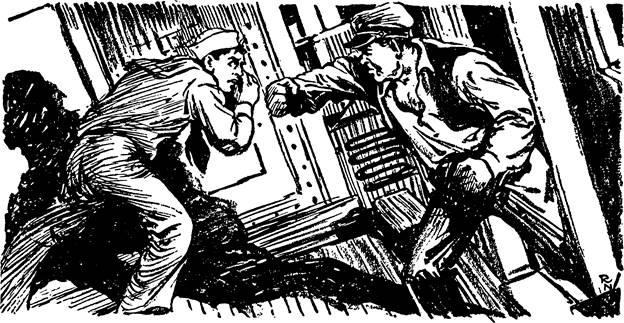 |
| Adventure, January 1, 1928 – Illustration by Ralph Nelson for Cease Firing by Ben J. Petmecky |
“FIRE!”
Booml
High up on the poop deck of the rusty old tramp steamer a breech loading rifle recoiled, then slipped smoothly forward into position. Out toward the horizon, spurts of water leaped skyward as a projectile clipped the wave tops. A black speck rose and fell. Blue clad figures about the breech of the gun blurred into action. “Cease firing!” the order rose above the clash of the closing breech.
“False alarm!” snapped the chief boatswain’s mate, lowering his binoculars. It’s only a floating barrel and I’m darn glad of it. The way you two guys are handling that gun, we would have been out of luck it if had happened to be the real article. Better snap out of it unless you are anxious to swim to Liverpool.”
The short, bowlegged seaman raised his eyes from the telescope sight and faced the chief, bristling.
“The elevation was about right,” he announced. “I can’t help it if that long drink of water don’t hold her on the mark.”
“Sure,” acquiesced the tall sailor on the opposite side of the gun, “I was wrong. You never made a miss in your life. Always on the mark—that’s you. I know they made a mistake and enlisted you in the Navy when you tried to join the Boy Scouts, but what cock eyed idiot ever let you get in the armed guard is more than I can see.”
A King of Man Eaters · N. Tourneur · ar
Black Sheep · Murray Leinster · na
 |
| Adventure, January 1, 1928 – Illustration by Ralph Nelson for Black Sheep by Murray Leinster |
WHEN Steve Galt struck a match in the darkness to light a cigaret, he kept one eye closed, range fashion, so that when he tossed away the match the one eye would be undazzled by the glow. The matchlight was amazingly bright. It lighted up Steve’s face, with some rather curious bitter lines about the lips, and the under side of his rather fine sombrero, and shimmered on the silk of his neckerchief. And stray gleams between his fingers disclosed the fine arched neck and alertly pricked up ears of his horse.
He puffed. The match flicked through the air, wavered where it fell and went out. Only the little red glow of the cigaret remained moving slowly through the utter blackness of the night.
“Kinda funny, Duke,” came Steve’s drawling voice, “me bein’ lost on th’ old Block H. It ain’t your fault. Y’uv never been heah before. But me, I was born heah an’ I lived heah until Uncle Peter kicked me out. Nice, gentle kinda feller Uncle Peter was—an’ is.”
There was pure irony in Steve’s meditative tones.
“My pa sure picked out a humdinger to raise me up . . . This heah’s a right nice range, Duke. You’ll like it. We’re cornin’ back heah to live some day if Uncle Peter ain’t persuaded the neighbors to be waitin’ as a lynchin’ party t’ welcome me . . . Kinda funny me bein’ lost though …”
He rode on slowly as one rides who has lost touch with landmarks and is not particularly worried about where he may be. Duke, the horse, picked his way leisurely through the occasional clumps of sage and chaparral. Dark clouds blotted out every star and there were small and intermittent flashes of light around the horizon. The earth smelled hot and dry.
The Camp-Fire · [The Readers] · lc
 |
| Adventure, January 1, 1928 – The Camp-Fire |
Dam(e) Rumor
SEVERAL peculiar tales concerning Adventure’s reversion to old policies, have floated in of late. Except that some of our tried and true friends in the far places of the world have been distressed or angered, there would be no reason to do more than smile at these queer distortions of the truth. But let me say once and for all that the magazine is not disowning its old comrades; rather is it attempting to weld them more and more closely in pleasant bonds which only death may break. And new members of the Camp-Fire fellowship may feel assured of a handclasp and the warmest of welcomes!
— Anthony M. Rud
Ask Adventure · Anon. · qa
The Trail Ahead · Anon. · cl
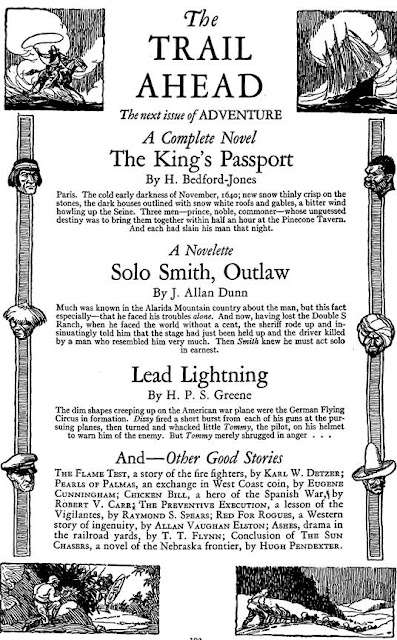 |
| Adventure, January 1, 1928 – The Trail Ahead |













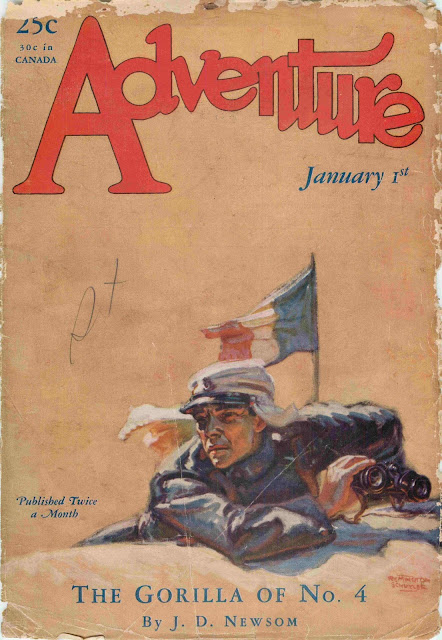
The Campfire paragraph by editor Anthony Rud is quite interesting. Alot of rumors must have been flying around because of the failure of the great experiment in publishing a higher quality ADVENTURE. Plus the fact that Arthur Sullivant Hoffman had just left the magazine after being editor for over 15 years.
I appreciate your sharing the Trail Ahead page for this issue. The next one looks like one to have.